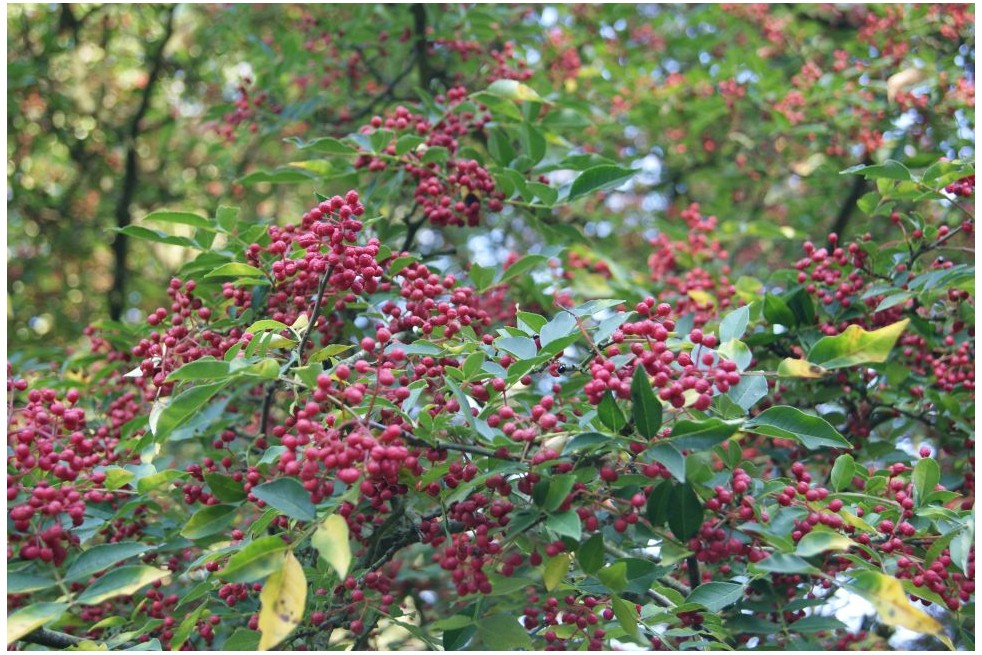- Out-of-Stock
Chinese pepper tree
Zanthoxylum simulans
Description
Zanthoxylum simulans – Chinese pepper tree
The Chinese pepper tree (Zanthoxylum simulans) is an aromatic shrub or small tree native to East Asia, known for its fragrant berries with a sharp and lemony flavor.
Origin and Characteristics
Originally from China (Sichuan region), Zanthoxylum simulans belongs to the rue family (Rutaceae), like citrus fruits. It is also called Sichuan pepper, Chinese Zanthoxylum, or false pepper shrub. Despite its name, it is botanically not a pepper plant, but its spicy husks are used similarly.
It is valued for its frost hardiness, thorny bushy growth, and, of course, its production of aromatic berries.
Description and Features
The Chinese pepper tree grows as a branched, dense bush, often with thorny branches. The leaves consist of small, dark green leaflets that emit a lemony scent when crushed. The inconspicuous yellow-green flowers appear in spring, followed by small red capsules that open in late summer releasing shiny black seeds.
- Mature height: 3 to 5 m
- Width: 2 to 4 m
- Foliage: Deciduous, dark green, aromatic
- Bark: Slightly ridged, brownish-gray
- Feature: Thorny branches; aromatic foliage and fruit
Plant Characteristics
- Type: Aromatic shrub or small tree
- Winter hardiness: Very good (down to -20 °C)
- Flowering period: April to May
- Fruiting period: August to September
- Self-pollinating: Yes (better yields with multiple plants)
Flowers and Fruit
- Flowers: Yellow-green, in small inconspicuous clusters
- Fruits: Red capsules that turn brown and contain black seeds. The husks are used as a spice, not the seeds.
- Taste: Aromatic, lemony, slightly numbing on the tongue
Location and Soil
- Light: Sun or light partial shade
- Soil: Light, fertile, well-drained. Also tolerates normal to slightly dry soils
- Good resistance to urban conditions and moderate wind
Planting
Plant in spring or autumn, in the ground or in a large pot (minimum 40 cm diameter).
Loosen the soil well and enrich with compost or organic fertilizer.
- Maintain 2 to 3 m spacing for hedges
- Water well after planting
Watering
- Regular watering in the first years
- Later drought tolerant
- Mulching in summer recommended to retain moisture
Pruning
- Form or maintenance pruning possible in late winter
- Remove shoots at the base or overly thorny branches if necessary
- Wear protection when pruning due to sharp thorns
Propagation
- By seeds (slow germination, cold stratification possible)
- Semi-hardwood cuttings in summer
- Sometimes natural self-seeding on light soils
Garden Use
The Chinese pepper tree is suitable for:
- Free-standing or fragrant herb hedges
- Exotic herb beds
- Container culture on terrace or balcony (with winter root protection)
- In vegetable gardens as natural insect protection
Disease Protection
- Very robust, hardly prone to diseases or pests
- Tolerant to urban pollution
- Only protect from extreme frost in pots or poorly drained soils
Harvest and Use
- Harvest husks: late August to October, when capsules open
- Use: Asian cuisine, sauces, marinades, flavoured oils, spicy desserts
- Usable fresh or dried
Tips for Optimal Yields
- Choose a sunny, warm, and sheltered spot
- Lightly fertilize in spring with compost or natural fertilizer
- Harvest regularly to prevent fruit drop
- Combine with other aromatic plants for a lively herb corner
Zanthoxylum simulans is an original, useful, and decorative aromatic plant, ideal for experimental and flavour-focused gardens. Its bushy form, protective thorns, and impressive berry production make it a distinctive partner both in vegetable gardens and in hedges or containers.
Features
- Common name : Chinese pepper tree
- Family : Rutaceae
- Category : tree
- Spread : 5M
- Foliage : deciduous
- Color of flowers : creamy white - green
- Fruit : Sichuan pepper
- Harvest : September - October
- Use : isolated - shruberry - kitchen garden
- Soil : all
- Habit : Spreading
- Earth to use : universal potting soil/garden soil/compost
- Enemies : nothing to report
- Possible diseases : resistant to diseases
Expédition & livraison
How does the delivery work?
 As soon as you place your order your plants are selected
As soon as you place your order your plants are selected Each order is processed individually.
Each order is processed individually. Plants are packed, staked and labeled.
Plants are packed, staked and labeled. Packaging is carefully implemented to avoid any problems.
Packaging is carefully implemented to avoid any problems. Packages are ready to be shipped.
Packages are ready to be shipped.
Our delivery methods
Shipping of our plants throughout Europe (except overseas and islands).
Customer reviews





























